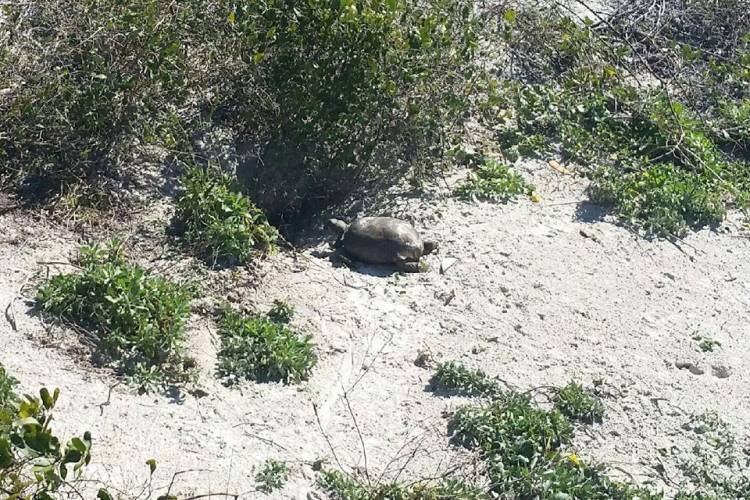Turtle Season in the Oldest City

We are so happy the beaches are open again and our guests are enjoying the refreshing and stress-relieving ocean breeze, the sound of the waves as they break on the beach, and the warm sunshine again. This time of the year is not only great to enjoy the weather in St. Augustine but also to catch a glimpse of the turtle nesting season in Northeast Florida.
Tips for Turtle Nesting Season
Nesting season is here in the state of Florida! The majority of nesting in Florida occurs between May 1 and October 31 and about 90 percent of all sea turtle nesting in the United States takes place on Florida’s beaches.
It is vital that both residents and visitors do your part to make sure sea turtles have a safe, successful nesting season. The following tips will help you and our marine life co-exist safely.
Use sea turtle-friendly lights or no lights at all.
Because hatchlings head for the brightest light source, artificial lighting can cause them to begin a fatal trek in the wrong direction away from the ocean. If you live in or are a guest in a beachside property, close drapes and blinds at night, shield or turn off outdoor lights that are visible on the beach. Doing these things not only leads hatchlings to head in the right directions, but also encourages females to come ashore to dig nests and lay their eggs.
Flatten sandcastles and fill in holes.
Your little one might be unhappy when that happens, but it’s extremely important to remove any obstacles that might injure or entrap hatchlings on their way to the water and it can also make it difficult for females who are crawling up on the beach to nest. Make sure all beach accessories are taken off the beach when you leave as well since they can also cause problems.
Take all food and trash with you.
There are many animals (raccoons, foxes, coyotes, etc.) who love our leftovers. Raccoons are one of the chief causes of sea turtle deaths on our beaches. Residents, please do not leave food outside for dogs and cats as it brings raccoons. Leftover trash, especially plastic bags, is extremely hazardous to marine animals. Turtles will think a plastic bag is a jellyfish (one of their favorite foods) and swallow it, often causing a fatal obstruction. Also, don’t place beach furniture close to a marked nest. It should be a minimum of 5 feet away.
Keep the FWC Number Handy
Program the Florida Wildlife Commission’s (FWC) Wildlife Alert Number into your phone so if you see a dead, sick, injured, or stranded sea turtle, you can quickly call for assistance. It is also important to report any harassment of turtles or disturbance of nests. They are protected under the Federal Endangered Species Act of 1973 and Florida's Marine Turtle Protection Act (379.2431, Florida Statutes). Florida Statutes restrict the take, possession, disturbance, mutilation, destruction, selling, transference, molestation, and harassment of marine turtles, nests or eggs. Hatchlings must crawl to the water by themselves. Scientists believe this trip to the water lets them imprint on their own beach.
No Fireworks on the Beach
It may seem like harmless fun, but loud noises and bright lights can disturb nesting females. Fires on the beach also pose a danger to sea turtles. Any fireworks beyond the sparkler type (shoot up in the sky) are also illegal in the state of Florida.
If you would like to watch a nesting turtle, join an organized sea turtle walk. You can check online to see if these walks are available and how to register. See our full guide to sea turtle nesting season here.
St. Augustine beaches are home a variety of beautiful sea animals: sea turtles, jellyfishes, stingrays, sea urchins, saltwater catfish, algae blooms, barnacles, sharks, dolphins, manatees, and lizards. It is important that you do not touch any marine life you encounter because they may bite, sting, or carry bacteria like Salmonella.
Reminders of Marine Life Laws
- Manatees: Touching a manatee is a misdemeanor, penalized with up to 60 days in jail and a $500.00 fine.
- Sea Turtles: Touching a sea turtle is illegal, penalized with up to one year in jail with fines up to $25,000.00. This law is taken very seriously because they are an endangered species.
Infractions of these laws are taken very seriously because they are both endangered species. The picture on this page is one of Anastasia Condo's own turtle residents who reside in our dunes!
